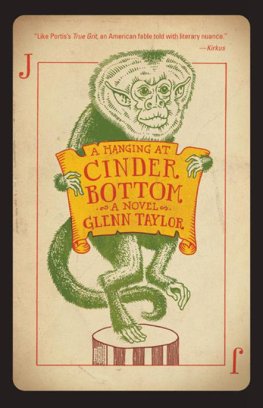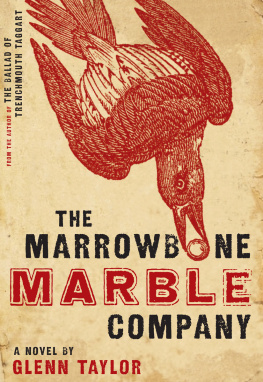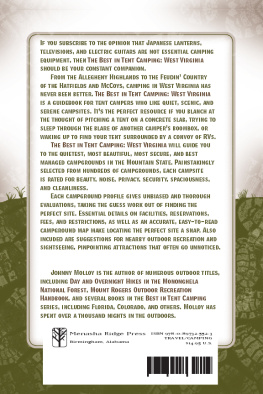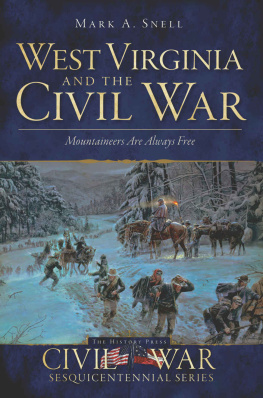Glenn Taylor
The Ballad of Trenchmouth Taggart
I have gulled the pith from a sumac limb To play a tune that my blood remembers.
Louise McNeill
On December 3rd, 2010, the old man sewed his mouth shut with saltwater-rated fishing line. The sores and the throbbing were back. It was his 108th birthday, and it was the day Time magazine sent a reporter to his home in Warm Hollow, West Virginia. This was on account of the old mans reputation, and on account of Pearl Thackery. Pearl Thackery was the oldest living West Virginian and had died the week prior, leaving the old man, a one time inventor, snake handler, cunnilinguist, sniper, woodsman, harmonica man, and newspaperman, as the oldest living Homo sapiens in the state.
Hed left a small, pinto bean-sized hole unsewn, so that he could ingest chicory coffee and spruce needle tea through a straw. So he could speak if he needed to. And so he could smoke his Chesterfields.
When the Time magazine reporter sat down across the kitchen table from him, the old man broke his vow of silence and mastered, in minutes, smoking and speaking simultaneously. It was a speech difficult to discern, but it was talking nonetheless. The reporter pushed the record button on his miniature, steel voice recorder. A red light the size of a tick lit up. The old man marveled at this invention. He stared at the little red circle until it went blurry there on the kitchen table. It entranced him. He spun a blown-glass ashtray with his plump-veined, purple-blotched hands. His skin was thin. A full white head of hair. His eyes and ears, though drooped and wrinkled, were still keen. He farted freely.
The reporter got down to business. Id like to ask you about your life, if I may, he said.
The old man leaned back in his split wood chair, then forward again. You want me to bend your ear? he said. Ill do it. But the bend I put on it wont never heal. Youre liable to go deaf. He pronounced deaf like deef. It was a lot of voice from a little hole. He said, I feel like that big small fella the Jewish actor played. Hoffman. Small Big Man. You seen it? He lit a cigarette and stuck it in the hole. Pulled white paper red. Was a time I had but two talents, he said. Back then it was speaking in tongues and pleasin women by way of their nether-regions.
The reporter cleared his throat.
I come up with the phrase, Id rather have a bottle in front of me than a frontal lobotomy. This was a bald-faced lie. He said, You may have heard along the way somewhere that I killed men. He considered the younger man, his hands and the way he held them on the table. His eyes. Then the old man bent his ear.
Let any man shoot me with cannon or gun.
Cap Hatfield
ONE. The Woman Could Cure Ailments
When Early Taggart was baptized in the Tug River in 1903, he was two months old. His mother, whose husband had left her a week earlier, had got religion. She believed it right to bring lambs to the fold before they could crawl or sit up on their own. Before Satan could fill their little blood vessels with the seven deadly sins. It was these sins that had caused her husband to run off, that she now preached on to her twelve pound boy while he breastfed.
But it was February when she decided to baptize him, and no preacher would agree to it. Youd have to break through the ice down there, the Methodist man said, and that boy aint old enough to get wet in the head anyhow. So Mittie Ann Taggart did it herself. She punched through the inchthick ice with her shoe heel and held her baby boy by his thighs. She dunked his head like wash. He came up screaming.
She claimed he spoke to her then, spit water at her cheek. Pretty as you please, pretty as you please, is what he said, according to Mittie Ann. Then he said, Devils got a hold on God.
She dropped him on the ice. He cracked through, went under and rode the current for a quarter mile. Then he kicked out onto the banks where a woman had melted through the ice washing a cast iron pot. This woman, Ona Dorsett, picked the boy up and blew her air in his mouth. She smacked his back until he colored up again, until he spit out the gray water through his nose holes. She wrapped him tight against her breastplate under a bearskin coat and took him home.
Mittie Ann Taggart went to the mayor. She demanded he call on all the preachers in the county to renounce Satan with a single cry of Down with Beelzebub. When the mayor surmised she had dumped her newborn child in the river, he ordered her confined. The boy was at first presumed dead. There was talk of lynching Mittie Ann in public for what shed done, hard talk considering she was a woman, and a white one at that. Then somebody said the widow Dorsett had the boy, was healthifying him like she had the other young one who lived with her up back of Warm Hollow. This was enough to calm the lynching talk, and Mittie Ann Taggart was transferred by horse and buggy to the Home for Incurables in Huntington. When she walked from the jail to the buggy, folks spat on her.
The widow Dorsett was thirty-one years old. A tall, dark-haired woman, strong-boned and plain. She had a three-year-old girl living with her. Girls name was Clarissa, and she had come to Ona Dorsett by way of a raped teenager who could not handle her situation and was running off to Charleston to get citified. Ona Dorsett had lost her husband in a mine cave-in in 1899. Shed never been able to reproduce. Shed spent her days tutoring children on how to read and write. That, and she helped her husband tend his moonshine still. When he was gone, she did less tutoring, more moonshining, and baby Clarissa was a welcome presence in her home.
The home was modest if not hazardous. A pioneer farmer had built it without the advantages of a permanent settlers dwelling. This was a cabin of unhewn logs. Its mass of cracks was filled and refilled with grass and mud. The roof was clapboard. The cookstove kept the space warm, and the fireplace sent smoke up and out through a cat-and-clay chimney hand-laid with stones.
It was here that Early Taggart would grow into a boy and then into a man. Here with Ona Dorsett, a woman who could do most anything, it seemed. A woman whose livelihood was the sale of moonshine, though she used a middleman on a small commission since woman moonshiners were not taken seriously. As far as she knew, she was the only woman shiner in the state. And she was certainly the only woman able to ride her dead husbands gelding of seventeen hands as if shed been born equestrian. Ona Dorsett had once loped across uneven hill terrain and dropped a black bear on the move as it watched her, unaware that such a sight was possible. Shed lined up her Winchester rifle and sunk a shell in the beating heart of a three hundred pound animal, all while posting bareback and calculating trees, distance, the movement of the horse below her. She skinned and filleted the animal, cured his meat. With this, and the meat of deer, turkeys, pheasants, and squirrels, she was able to feed her two adopted children. Though she did not particularly enjoy it, she hunted regularly for them and took pride in her efficiency.
The woman could also cure ailments. She made fever-killer drinks from dogwood bark. If rheumatism visited her children, she bathed them in water she collected every year from a stream before sun-up on Ash Wednesday. For double rheumatism insurance, shed turn their shoes upside down before bedtime. For coughs, she had procured a respectable stockpile of Virginia snakeroot. Hacking coughs meant swallowing the unmistakably bitter bears-foot tea. Inflammation of the chest required horseradish and mustard poultices to aid in breathing, and she could wrap these in such a way as to provide instant mother-comfort.










